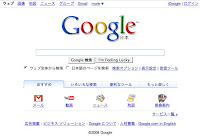Internet Based Market Entry
 Yesterday I came down with a case of the Mumps, therefore I have the time to put something together on firms using Internet based market entry. Enjoy!
Yesterday I came down with a case of the Mumps, therefore I have the time to put something together on firms using Internet based market entry. Enjoy!The Internet provides a market entry method that is particularly suitable for smaller, widespread niche markets. Whilst websites might be accessible worldwide, however, the firm may need to select markets to focus on, possibly excluding those where there may be particular barriers, such as language, legal, payment and over fulfilment problems. The cost of organising to serve certain markets might outweigh the possible benefits. For firms that already have a strong presence in many markets the Internet supports all aspects of their activity.
Web based services will be successful if firms develop a global strategy based upon the integrated value chain. As this is a pervasive method of entry, based on global communications, it can facilitate lower risk access to difficult markets. By building online delivery capability it is possible to service markets profitably where there might be limited demand. of course, an e-commerce strategy is limited scope simply because it appeals to a very specific transnational segment - those that are able to gain access, particularly high speed access, continues to grow this is a diminishing problem.
Read more...

